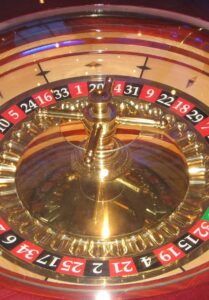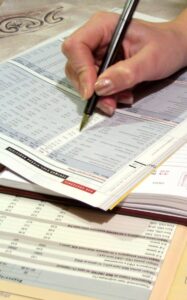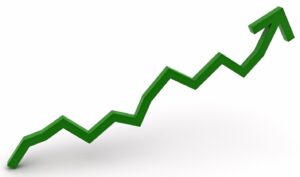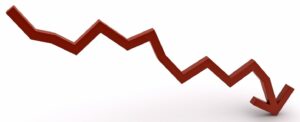This has to be one aspect of investing and personal finance that is riddled with many an example of bad investment advice. The question itself – What is the best stock trading strategy – presupposes there is a simple or standard answer.
Probably the best answer is whatever strategy works best for you. Now that may sound like a cop-out but really it isn’t. Here are just some reasons to arrive at that conclusion.

Myths, misconceptions, and pieces of bad investment advice
For a moment let’s just have a look at some famous myths, misconceptions, and pieces of bad investment advice. One of my all-time favorites has to be:
“Pick your stocks carefully and then watch them like a hawk!”
I’ll never forget when a good friend of mine mechanically trotted this out thinking this was how all serious stock investors worked. Here are some others you may come across:
- “Stock trading is like gambling”
- “Look out for hot stocks”.
- “Professional investors always outperform the market”.
- “Take stock picks from people you trust”
- “What goes up must come down” and its corollary “What goes down must go up”
- “Diversification dilutes upside potential”
There are many others and variants on those above many of which boil down to similar misconceptions.
Stock market or casino?
Firstly gambling is a zero-sum game stacked in favor of the casino. The odds of you  walking out with more than you had when you walked in are already against you because the casino is always going to ensure it makes money. The fundamental difference with the stock market is that when you buy common shares you are buying a piece of a company. And a company is an ongoing business that has assets, is engaged in activities that increase the overall value in the economy, and is generating revenues. Essentially you will be buying a piece of that action.
walking out with more than you had when you walked in are already against you because the casino is always going to ensure it makes money. The fundamental difference with the stock market is that when you buy common shares you are buying a piece of a company. And a company is an ongoing business that has assets, is engaged in activities that increase the overall value in the economy, and is generating revenues. Essentially you will be buying a piece of that action.
The notion that stock investing is like gambling can also lead to two misconceptions
- That stock investing is only for high-wealth individuals,
- That stock investing is a source of entertainment.
There are many ways to start investing and in fact, it is often best to start small as your understanding of how markets work and how you work with markets grows. So you don’t need to be fabulously wealthy. That is it a source of entertainment that has an element of truth but watching stock prices change doesn’t really match up to a good movie or an exciting sports game.
Being on the lookout for “hot stocks” is another classic. Unless you really did get in before the crowd the chances of cashing in on a “hot stock” are frankly remote. There are so many sharks out there trying to pull this sort of thing off. The chances of getting sucked into a pump and dump scheme are really high. Very simply:
Unscrupulous traders buy, typically a little known stock with low trading volume. Then by spreading or publicizing false information that the stock value is going up – they PUMP up the value by drawing others in to buy the stock. The more hopefuls join the fray the higher the price rises. Then when the perpetrators of the scheme think that it has run its course, they sell their holdings, i.e the DUMP their stock before it collapses. That typically crashes the stock price leaving those who got in during the rise with worthless stock.
Professional investors
 Another misconception is that professional traders who know more, are really clever, know what stocks to look for, when to buy, and when to sell and they do better than the market. The reality is that a good 70 percent of professional fund managers and traders will underperform a basic market index such as the Standard and Poor’s 500 over the long run.
Another misconception is that professional traders who know more, are really clever, know what stocks to look for, when to buy, and when to sell and they do better than the market. The reality is that a good 70 percent of professional fund managers and traders will underperform a basic market index such as the Standard and Poor’s 500 over the long run.
The gigantic brain of the stock market
Here’s how to look at this. The stock market adjusts the prices of the stocks of the companies listed by balancing the demand to buy each stock with the offers to sell each stock setting the price to achieve the largest trading volume at that time. To learn more about how market work, check here.
It is reasonable to say that many of those stock trades are driven by the desires and knowledge of the buyers and sellers. I am not saying that their desires, knowledge, and intelligence are rational – just that they are reflected in their trading activity. So effectively the market acts as a gigantic brain, or thinking machine that factors all the knowledge of all the buyers and sellers into the prices of each stock at any one time.
If you are going to try to “beat the market” you are basically saying that you know more, are cleverer, more intelligent than all those other buyers and sellers put together. That may well be the case and in some instances, you may be right especially when the market is behaving irrationally. On the other hand, it is a pretty bold and reckless position to take over the long run.
To misquote one of my favorite authors – its a bit like expecting a tea leaf to understand the geopolitical strategy of the East India Company.
The “trustworthy” source
Mea culpa – Here is one that I have fallen for and more than once. I once “invested” a silly sum of money in a limited  partnership of people I knew and trusted thinking that they knew what they were doing. In reality, I was buying a warm cozy feeling that I was somehow part of an elite group of private investors privileged to be in on this great opportunity.
partnership of people I knew and trusted thinking that they knew what they were doing. In reality, I was buying a warm cozy feeling that I was somehow part of an elite group of private investors privileged to be in on this great opportunity.
Within a matter of weeks, it all went south. In reality, these guys didn’t have a clue what they were doing and they lost all our money on a real estate bridging loan for some deal or other that didn’t happen. Limited Partnership – so it was all gone. We had all signed away our rights.
Another time I got what was effectively a stock tip from someone who I thought was wise beyond reproach. Maybe he was wise in other matters but the stock tanked. In fact, it was the first stock I bought with an Etrade account that I opened for that very purpose. Fortunately, I had only taken a very small position.
I keep that stock in my account – it is clearly visible at the top of the alphabetical list. It serves as a reminder to me – not to take “hot stock” tips from whoever!
What goes up comes down and what goes down goes up?
 Not really. Remember a stock is a piece of a company and its price represents in some convoluted way, the collective opinion of the market – that gigantic brain explained above – in terms of its future earnings value. If that company is going out of business, has no more sales from its regular operations and it has already sold all its assets, or worse borrowed heavily against all its assets then at some point the market will wise up and the stock price will hit zero.
Not really. Remember a stock is a piece of a company and its price represents in some convoluted way, the collective opinion of the market – that gigantic brain explained above – in terms of its future earnings value. If that company is going out of business, has no more sales from its regular operations and it has already sold all its assets, or worse borrowed heavily against all its assets then at some point the market will wise up and the stock price will hit zero.
So what goes down may just carry on going down.
And what goes up may just carry on going up. Until such time as it does come down of course. But would you be confident you could work out when that price or market correction is coming? Maybe.

To diversify or not to diversify?
There are two different scenarios and schools of thought here. If you are pursuing some kind of entrepreneurial venture, then it may make sense to focus your efforts on where you have the available resources, there is the potential for maximum benefits with minimum or acceptable risks. In this case – focus and do not diversify.
If, on the other hand, you are building a long term investment portfolio then diversify. Please diversify.
Is it entertainment you want or results?
I should have asked myself this question in my early years of investing. On reflection, many of the investment decisions I made in those earlier years were driven by a desire to see wealth build rapidly and to get a buzz by making exotic moves like opening a managed futures account for the minimum amount, or signing up for that elite limited partnership venture I mentioned a while back.
But really that was mostly about feeling like a high-flying stock trading movie character. That can be a very expensive feeling which takes us back to that first piece of bad investment advice.

Pick stocks carefully then watch like a hawk!
You can only really do that if you have a handful of stocks. More than about a dozen positions and you will not be able to follow their stories and watch them all, assuming you have a day job. A dozen stocks is not a diversified portfolio. So this kind of approach really is just another form of probably high-risk entertainment.
It has to work for you
We go back to our earlier conclusion.
The best stock trading strategy is the one that works for you.
That means a strategy that takes into account:
- your investment objectives, where you live and where you want to live and when you want to retire
- your current age
- your prospective earnings over your working life and how much you will need to spend to maintain your lifestyle
- your appetite for risk
- how much time you are able to dedicate to managing your investments
- how much time you are willing to invest in learning about investing
We’ll get into different stock trading strategies another time.

Affiliate Disclosure: This article contains affiliate links. If you click on a link and buy something, I may receive a commission. You will pay no more so please go ahead and feel free to make a purchase. Thank you!
I have been wanting to invest in the stock market but i never have because i dont know anything about it or dont even know where to start. After reading this article it has made me feel a little better about going ahead and making the decision to invest. I feel i know a little more about what im getting into. Thanks
A lot of people feel this way. I grew up in a family where stock investing just wasn’t something we did. It was for rich clever people not humble folks like us. It was actually my father in law who said to me – you are someone who should be investing in stocks. It was his comment to me that changed my perception. I’ve made a ton of mistakes over the years. But finally I feel as if I know what I am doing. Good luck to you and thanks for engaging.
My wife has been investing in the stock markets of the US, Brazil, etc. I am not familiar with the stock market. If I ask her about some details of the stock market, she usually tells me, “Study yourself”. Maybe, your site is an excellent resource to gain some knowledge of the economy and stock market. I will be able to understand what my wife says in the future. Probably, she will be surprised by my updated knowledge.
At least, I know that some myths such as “Stock trading is like gambling” are not right. I am aware that investment in a company requires a lot of study by checking its history, performance, and potentials. This is what I learned from my wife. 🙂
Thank you for introducing the story of “unscrupulous traders”. This is the scenario happening a lot all over the world these days. As you indicated, I believe that beating the market is impossible in the long run. Several governments have tried to beat it in vain.
To be honest with you, some expressions sound foreign to me, such as Standard and Poor’s 500. I can sense that you have a deep understanding of the stock market. I am looking forward to reading more of your articles. Thank you for providing useful knowledge.
Thanks for engaging. Professional investors and traders working in the industry will typically do a lot of research on companies before either making a recommendation or committing funds that they manage and this may be what you wife does or maybe she does this research on her own account. But one of the advantages for the smaller scale investor is precisely that there is so much professional research being done that will get reflected in the price of the stock. There are a number of tried and tested ways to determine the value of a company and hence its stock and there are many sources of information to explain how that works and how to use that information to make buy and sell decisions. Thanks for engaging again.
Hey Andy! I really like your stock trading advice. I’d love to hear your take on the current situation as the markets are plummeting due to the COVID-19 epidemic. I guess now is a good time to start buying as the market is down right? But there’s no knowing when and what companies will revive. I’d love to hear the thought of someone with experience like you!
Hi Jukka, These are dodgy times to be discussing the stock market. It is very tempting at times like these for traders to try and make clever moves but the fact is I don’t think anyone know or can even guess yet where the bottom of the market is. About ten days ago I was walking home from the station with a banker friend of mine and we were saying to ourselves that the fundamentals are all good so hold tight and ride it out. I will still hold tight but I’m not so sure how well companies can fare if the supply chain disruption, social distancing, schools and colleges closing, lock downs and suspension of activities in groups last many months – which they will. In these kinds of circumstances people are going to be looking for winners with obvious products and services, medical and emergency supplies for example. I think though we are in for a long haul so the question I would be asking myself would be what kinds of companies are best equipped to ride this out. A company that already has most of its critical workforce able to work remotely online, whose market for its goods or services is going to stay steady and therefore sells mostly or entirely online and whose supply lines are similarly pandemic-proof. We live in interesting times. Stay well!